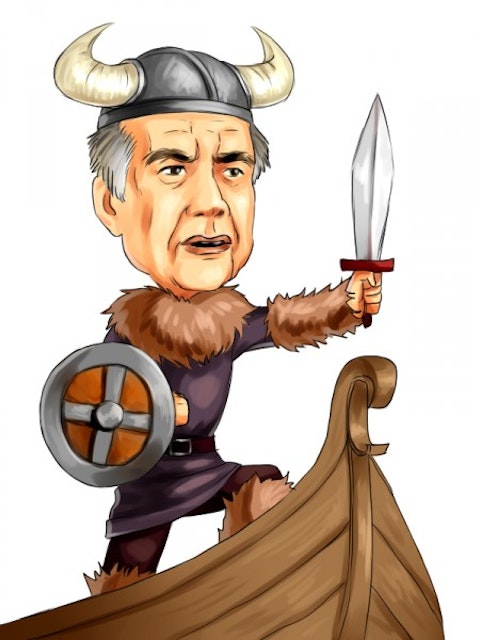Activist investor and billionaire Carl Icahn is one of the Street personalities that is always on the radars of investors and often takes his opinions public either via interviews or directly via social media. Earlier today, Mr. Icahn released a video on his website, in which he reiterated some of his concerns regarding the stock market and the economy. The video, titled “Danger Ahead”, is an outline that presents the inefficiencies of both the current U.S government and the activity of the major companies in the U.S, from Icahn’s perspective.

“I want to speak out now, because (I know this may sound corny) I grew up in the streets of Queens. I love this country and I feel so strongly about the dysfunction that’s been going on both in Washington and the boardrooms of corporate America,” Icahn said.
Mr. Icahn also didn’t miss the chance to express his support for the 2016 presidential candidate Donald Trump, saying that even though he disagrees with him on some issues, the U.S needs “a president that can move Congress.” The investor added that one of the main problems of the current legislation is the “carried tax loophole”.
“We need government to get out of this gridlock, to get out of this dysfunction. A quintessential example is repatriation, which to translate means that there is $2.2 trillion in profits that American companies have earned in Asia, South America and Europe. Companies are domiciled in this country, but make goods in another country, produce and sell them there, nothing to do with the United States.”
The fact that companies don’t want to bring their money back to the U.S is because it’s unfair to them to pay a double tax. In this way, Mr. Icahn considers that the repatriation of capital could be very beneficial, even if the taxes paid are much smaller or even abolished altogether, because this capital would lead to the creation of jobs and more investment in the U.S.
Follow Carl C. Icahn's Icahn Capital LP
Another issue that Mr. Icahn mentioned is the low interest rate environment. The companies benefit from cheap borrowing and instead of investing this money in new equipment or in improving the efficiency of their workers, they acquire other companies in order to show investors and analysts on the Street that they have higher earnings and increase the stock price, a move that the investor calls “almost perverse”. In this way, the earnings that companies are currently reporting are often artificially inflated. The companies provide their guidance, while excluding stock compensation, restructuring costs, intangible assets, and takeover costs.
“It’s like taking a drug: borrowing money very cheaply, taking over another company. You feel good [.,.]”
Stock buybacks is another problem currently faced by corporate America, according to Mr. Icahn. Buybacks provide a “short-term fix” and many companies that engage in large buyback programs should not be doing them at all, because it weakens the balance sheet. However, Mr. Icahn added that it is not the case for companies like Apple Inc. (NASDAQ:AAPL), in which Icahn Capital is one of the largest shareholders. Apple has around $200 billion in cash and has very low debt, so it should be buying back stock. On the other hand, companies that Mr. Icahn is shorting, often trade at over 30 times earnings and have “no net worth” because of buybacks. Those stocks grow mainly on the back of higher reported earnings per share, but their GAAP earnings haven’t actually grown.
In this way, low interest rates are building bubbles in real estate, equities, and other markets. This leads to smaller investors being forced to start buying riskier stocks and even high-yield bonds.
“High-yields really stands for junk bonds. People are buying these not really understanding what they are buying. And if you just look at the numbers, they are amazingly risky. You have $2.2 trillion of junk bonds, up five years ago, up a trillion dollars. That’s a hell of a lot when you think about the whole S&P is $19 trillion.”
Wall Street sells these high-yield bonds without any consideration for the people who buy them, who are losing money, which is especially bad taking into account that many big players on the Street are shorting the same securities they sell.
“I look back and I love this country, but I sure as hell don’t love a lot of politicians in it. They are taking advantage of the system and it’s just deja vu. […] I think it was Santayana that said “Those who don’t learn from the history are doomed to repeat it.” And I am afraid we are going down that road,” Mr. Icahn concluded.
Icahn Capital currently holds a public equity portfolio worth around $31 billion, with the largest part invested in its own stock, Icahn Enterprises LP (NASDAQ:IEP), which amasses over 30% of its equity portfolio. On the second and third spots are Apple Inc. (NASDAQ:AAPL) and eBay Inc (NASDAQ:EBAY), in which the fund holds 52.76 million shares and 46.27 million shares respectively. They are followed by CVR Energy, Inc. (NYSE:CVI) and Federal-Mogul Holdings Corp (NASDAQ:FDML), with stakes of 71.20 million shares and 138.59 million shares respectively.
Disclosure: None





